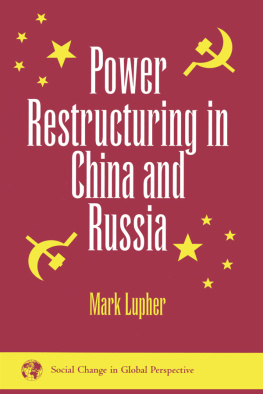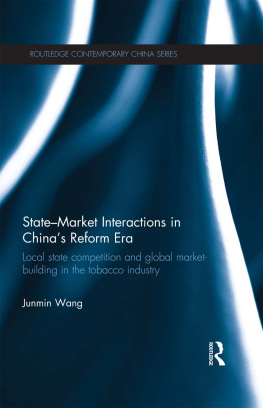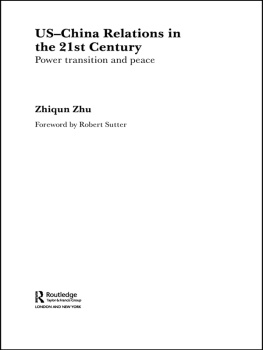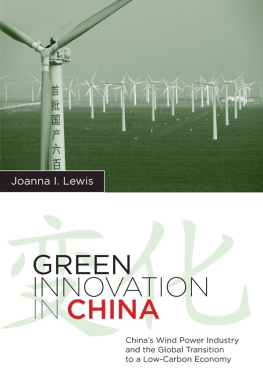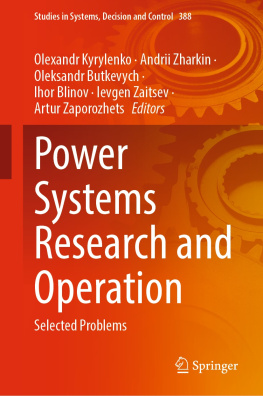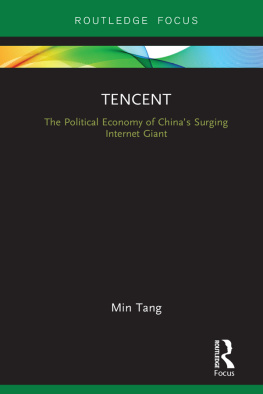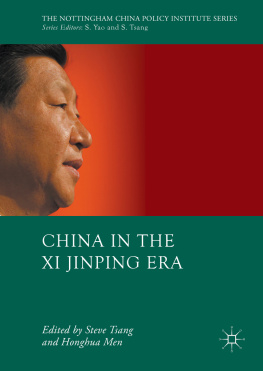POWERING CHINA
Powering China
Reforming the electric power industry in China
Xu Yi-Chong
St. Francis Xavier University, Nova Scotia
Key Centre of Ethics, Law, Justice and Governance, Australia
First published 2002 by Dartmouth Publishing Company and Ashgate Publishing
Reissued 2018 by Routledge
2 Park Square, Milton Park, Abingdon, Oxon OX14 4RN
711 Third Avenue, New York, NY 10017, USA
Routledge is an imprint of the Taylor & Francis Group, an informa business
Copyright Xu Yi-chong 2002
The author has asserted her moral right under the Copyright, Designs and Patents Act, 1988, to be identified as the author of this work.
All rights reserved. No part of this book may be reprinted or reproduced or utilised in any form or by any electronic, mechanical, or other means, now known or hereafter invented, including photocopying and recording, or in any information storage or retrieval system, without permission in writing from the publishers.
Notice:
Product or corporate names may be trademarks or registered trademarks, and are used only for identification and explanation without intent to infringe.
Publisher's Note
The publisher has gone to great lengths to ensure the quality of this reprint but points out that some imperfections in the original copies may be apparent.
Disclaimer
The publisher has made every effort to trace copyright holders and welcomes correspondence from those they have been unable to contact.
A Library of Congress record exists under LC control number: 2001099958
ISBN 13: 978-1-138-73856-0 (hbk)
ISBN 13: 978-1-138-73853-9 (pbk)
ISBN 13: 978-1-315-18470-8 (ebk)
This project springs from an inspiring seminar offered at School of Politics and Public Policy, Griffith University in Brisbane, Australia. I owe my thanks to all the participants whose interest and responses made this project grow and grow. I would also like to thank the School and its head, John Kane, for their hospitality in acting as host during my two lengthy visits in 2000 and 2001.
My visits to Australia and China were made possible by assistance from Griffith's Key Centre in Ethics, Law, Justice and Governance and two grants of University Council for Research from St. Francis Xavier University.
Preparing a text for publication inevitably requires help. I am very lucky to have Sue Jarvis as an efficient editor and Olwen Schubert a patient setter of the text during its production. I am grateful for their assistance.
Over the years, Jim Bickerton and Frank Harrison have given me constant support in my time at St. Francis Xavier. They have both aided me to a greater degree than they may realise.
And then, there is Pat to whom I owe my greatest debt of gratitude for his encouragement, patience, forbearance and, most importantly, his belief in me. Professor Patrick Weller has borne with me through dejection and inspiration as this project has evolved.
Xu Yi-chong
Brisbane
- AC Alternating current
- APP Affiliated power producer/provider
- BOT Build-operate-transfer
- BPA Bonneville Power Administration
- CCP Chinese Communist Party
- CEB Central Electricity Board
- CEC China Electricity Council
- CECIC China Energy Conservation Investment Corporation
- CEE Central and Eastern European
- CEGB Central Electricity Generation Board
- CPIC China Power Investment Corporation
- EdF Electricit de France
- FDI Foreign direct investment
- FERC Federal Energy Regulatory Commission
- ICBC Industrial and Commercial Bank of China
- IPP Independent power producer/provider
- ISO Independent system operator
- KEPCO Korea Electric Power Corporation
- MEP Ministry of Electric Power
- MOE Ministry of Energy
- MOFTEC Ministry of Foreign Trade and Economic Cooperation
- MWREP Ministry of Water Reservation and Electric Power
- NPC National People's Congress
- NYSE New York Stock Exchange
- OFFER Office of Electricity Regulation
- PBC People's Bank of China
- PPA Power purchasing agreement
- PURPA Public Regulatory Policies Act
- SAFE State Administration for Foreign Exchange
- SDPC State Development and Planning Commission
- SEC State Economic Commission
- SEPCO Shandong Electric Power Corporation
- SETC State Economic and Trade Commission
- SIDC State Investment and Development Corporation
- SOE State-owned enterprise
- SPC State Planning Commission
- SPCC State Power Corporation of China
- TVA Tennessee Valley Authority
Alternating current : An electric current that reverses its direction at regularly recurring intervals, usually 50 or 60 times per second.
Cogeneration: The production of electrical energy and another form of useful energy (such as heat or steam) through the sequential use of energy.
Cogenerator. A generating facility that produces electricity and another form of useful thermal energy (such as heat or steam) used for industrial, commercial, heating or cooling purposes.
Current (electric): A flow of electrons in an electrical conductor. The strength or rate of movement of the electricity is measured in amperes.
Distribution : The delivery of electricity to retail customers.
Distribution system : The portion of an electric system that is dedicated to delivering electric energy to an end-user.
Electricity : A form of energy characterized by the presence and motion of elementary charged particles generated by friction, induction or chemical change.
Electricity capacity. The maximum load of electric power, commonly expressed in megawatts (MW), by which generators, turbines, transformers, transmission circuits, stations or systems are rated.
Electricity demand : The rate at which energy is delivered to loads and scheduling points by generation, transmission, and distribution facilities.
Electricity generation: The process of producing electric energy or the amount of electric energy produced by transforming other forms of energy, commonly expressed in kilowatt hours (kwh) or megawatt hours (MWh).
Electric power The rate at which electric energy is transferred. Electric power is measured by capacity and commonly expressed in megawatts (MW).
Electric power plant: A facility containing prime movers, electric generators and auxiliary equipment for converting mechanical, chemical and/or fission energy into electric energy.
Electric system : Physically connected generation, transmission and distribution facilities operated as an integrated unit under one central management, or operating supervision.
Energy: The capacity for doing work as measured by the capability of doing work (potential energy) or the conversion of this capability to motion (kinetic energy). Energy has several forms, some of which are easily convertible and can be changed to another form useful for work. Most of the world's convertible energy comes from fossil fuels that are burned to produce heat that is then used as a transfer medium to mechanical or other means in order to accomplish tasks. Electrical energy is usually measured in kilowatt hours, while heat energy is usually measured in British thermal units.


